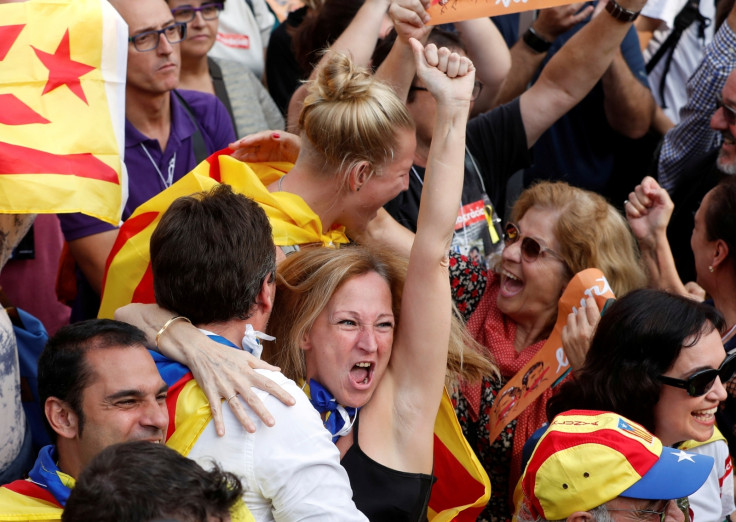Those on the left who love the whiff of 'revolution' have been blindsided by Catalan separatism
Defending the right to Catalan self-determination should not oblige those on the left to support it
There is a certain type of political temperament that is drawn almost irrevocably to anything which emits even the faintest whiff of 'revolution'. The eruption of the conflict in Catalonia between the Spanish state and the separatist movement has been a useful case in point.
For some, because Catalan separatism has mobilised its supporters against a reactionary capitalist state, it must by definition have something going for it. This logic is buttressed by the fact that the dictatorship of General Franco violently suppressed all facets of Catalan culture while the incumbent Popular Party - arguably its successor movement - clings to the notion that the Catalans are a nationality but not a nation.
As a Spanish friend recently put it to me, it is nearly impossible to imagine the Spanish Conservative Prime Minister Mariano Rajoy following the lead of David Cameron in Scotland and granting Catalans the right to hold an official referendum. If he did, Rajoy would "lose all the conservatives", my friend told me.
Images of Spain's Guardia Civil whacking old ladies over the head with rubber truncheons have only served to cement the narrative of a plucky Catalonia intent on self-determination verses a post-Francoist Popular Party that is only ostensibly post-Francoist. Some 800 people were injured during the clashes between police and voters on October 1, while local newspapers were raided and their journalists harassed.
"When I see an actual flesh-and-blood worker in conflict with his natural enemy, the policeman, I do not have to ask myself which side I am on," as George Orwell, whose placard adorns a modest square in Barcelona, once wrote. In this instance, the 'side' one ought to be on is undoubtedly that of the Catalans.
But this is only true up to a point. Spain's constitution was created in 1978 with a fear that the Franco dictatorship could return. And it almost did in 1981, when right-wing elements in the army stormed the Congress of Deputies and took 350 MPs hostage. As things stand the constitution of '78 does not allow Catalonia to hold a referendum, and asserts in Francoist language "the indissoluble unity of the Spanish nation". Rajoy's argument against a Catalan referendum is both self-serving and circular. The current referendum is 'illegal' under the constitution; yet the ruling Popular Party will block any attempt to reform the constitution.

To most fair-minded people this is an obvious injustice – around 80 per cent of people in Catalonia are said to favour the holding of an official referendum. The intransigence of the Popular Party is an affront to any meaningful concept of self-determination: the right of a people to decide their own destiny.
In truth it is hard not to see in it at least an echo of the Francista attitude toward Spain's autonomous regions. During the fag-end of the Civil War, Franco's rebel army led a "deliberately ponderous war of annihilation" through Catalonia and other formerly autonomous regions, according to the Spain scholar Paul Preston. The purpose of the brutal policy (Spain has the dubious honour of containing the second highest number of disappeared persons in the world after Cambodia) was to strike fear into potentially restless populations in the early days of the dictatorship.
But despite the historic repressions of Spain's autonomous regions, it is worth asking the question posed by Rosa Luxemburg a century ago in terms of what the basis for the current push toward Catalan self-determination might be. "The 'nation'", Luxemburg wrote, "should have the 'right' to self-determination. But who is that 'nation' and who has the authority and the 'right' to speak for the 'nation' and express its will?"
How, she added, can we find out what the nation actually wants?
In the case of Catalonia, the actions of the government of Carlos Puigdemont represent a legitimate mobilisation. But the referendum of October 1 is not the referendum the Catalan people need. Nor does its result give us a clear idea of what the nation actually wants.
The poll of October 1 produced a majority of 90 per cent for independence on a meagre turnout of 42 per cent. Many of those opposed to secession boycotted the vote entirely. In contrast, according to a June 2017 poll, just 41 per cent of Catalans were in favour of an independent state, compared to 49 per cent who were against it. Support for independence peaked at 57 per cent in 2012, but for the past decade a slim majority have consistently favoured remaining part of Spain. Puigdemont himself governs with a slim majority based on only a minority of the popular vote produced by regional elections which took place in 2015.
Indeed, part of Puigdemont's flag-waving strategy appears to be aimed at distracting the Catalan people from his government's own austerity drive. Interestingly, a recent analysis of polling data by the Atlantic found a strong correlation between support for independence and unemployment in Catalonia, squashing the liberal assumption that outbursts of nationalist fervour appear as if by magic.
Uncritical cheerleaders for Catalonian independence ought perhaps to keep in mind Bertrand Russell's warning about the "fallacy of the superior virtue of the oppressed". The familiar rushing toward the supposed underdog – whereby all his ideas are swallowed uncritically – is an unfortunate habit on the left, and brings to mind some of the other sordid dalliances of the past decade or so which were rooted in a similar logic of 'my enemy's enemy is my friend'.
In Catalonia, defending the right to self-determination in no way obliges one to support it - especially when it is built on such flimsy democratic grounds as this.
© Copyright IBTimes 2025. All rights reserved.






















